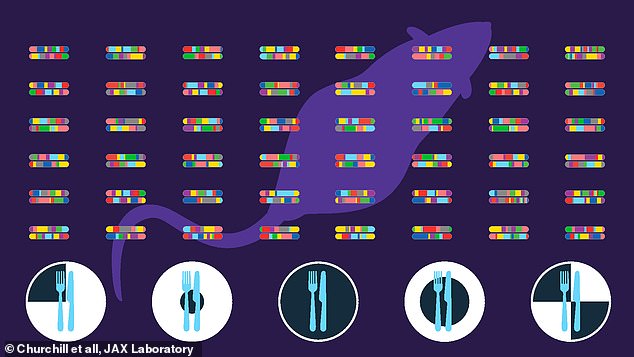Fasting to lose weight and live longer might not be the miracle solution that wellness gurus would have you believe.
A study just revealed that when it comes to dieting, the best way to add years to your life may be to simply reduce your daily calories.
The research, conducted on mice, found that those who reduced daily calories by 20 to 40 percent lived on average a third longer than mice who ate whatever they wanted.
So in humans, if you’re someone who consumes 2,500 calories a day, that would be the equivalent of cutting out a bagel with cream cheese or two avocados.
Mice that ate fewer calories overall also fared better than mice that fasted for one or two days in a row, suggesting that eating regularly is beneficial for health.
To calculate your daily calorie needs, scroll to the end of this article.
Time-restricted eating has been a popular technique in fitness and diet circles for decades. But this study suggests it has fewer longevity benefits than simply following a normal schedule with fewer calories overall, in mice.
Dr Gary Churchill, the Karl Gunnar Johansson Professor and professor at the Jackson Laboratory who led the study, told DailyMail.com that mice that followed a low-calorie diet for a long period of time without losing much body weight lived longer.
This means that it is not only your diet that influences your longevity, but also your genetics.
“The most robust animals maintain their weight even in the face of stress and caloric restriction, and they live the longest,” Dr. Churchill said.
Researchers have known since at least the 1930s that restricting calories in the laboratory can help animals live longer.
In humans, having a healthy body weight can help keep blood pressure and cholesterol under control, decreasing the likelihood of developing diseases such as diabetes, heart disease and cancer, all of which lead to a shorter life expectancy. according to the mayo clinic.
For some people, this means gradually reducing the amount of food they eat to gain or lose weight.
Still, Dr. Churchill said, the best way to do this and the effect fewer calories have on the body at a cellular level is a widely debated topic.
So he and his fellow scientists at the Jackson Laboratory, an independent research group that specializes in genetic research, began investigating this topic almost a decade ago. Their results have just been published in the Nature magazine.
They placed nearly 100 mice on five different diets and observed them throughout their lives to see what happened to their health.
In the first group the animals could eat as much food as they wanted, at any time. In the second, the mice received 60 percent of their initial calories. In the third, the mice received 80 percent of their initial calories.
In the fourth, the mice fasted for one day and then ate whatever they wanted for the rest of the week. In the fifth, the mice fasted for two days and then ate whatever they wanted for the rest of the week.
The average lifespan of the mice that ate unrestricted was 25 months. Those who fasted lived 28 months.
Those who ate 80 percent of their baseline lived 30 months, 20 percent longer than the unrestricted group. Finally, those who ate 60 percent of their baseline lived an average of 34 months, 36 percent longer than the unrestricted group.
Dr Churchill noted: “We extended lifespan with these extreme interventions, but they also had some serious drawbacks.” The calorie-restricted mice were cold, hungry, and showed signs of a weaker immune system, so they were more likely to get sick than the unrestricted mice.
“These diets are extreme,” he told DM.com. Therefore, it should not be something that humans consider adopting.

The five diets included one without restrictions, two that included fasting, and two that included calorie restriction. Calorie-restrictive diets showed the greatest increase in longevity
It’s important to keep your weight and blood sugar stable, he said. But instead of thinking about restricting calories to that extent, he said, you can focus on eating a balanced diet and consider eating a little less if you’re looking to lose some weight.
Metabolic rate calculators, which use your body weight, age, height, and activity level, can help give someone an idea of how many calories they may need to adjust to lose weight.
Interestingly, Dr. Churchill said, not all mice within the calorie-restricted groups fared equally. Some lived very short lives, while others live up to four years.
The difference between these groups is that those who lived longer were able to maintain a relatively stable weight. So it wasn’t as simple as the fact that restricting calories helped the mice lose weight and therefore become healthier.
Rather, it suggests that what might be more important than weight or calories is the body’s resistance to stress.
This also has to do with genes, Dr. Churchill said. These probably have a greater effect on your life expectancy than your diet. ‘If your grandmother lived to be over 90, that is not under your control. But if he did, that’s an advantage,” he said.
Other factors, such as avoiding sunburn and smoking, also play a role. When it comes to diet, he said, consider it as one of many factors that can extend your lifestyle. In a nutshell, he said, “pay attention to your health.”


